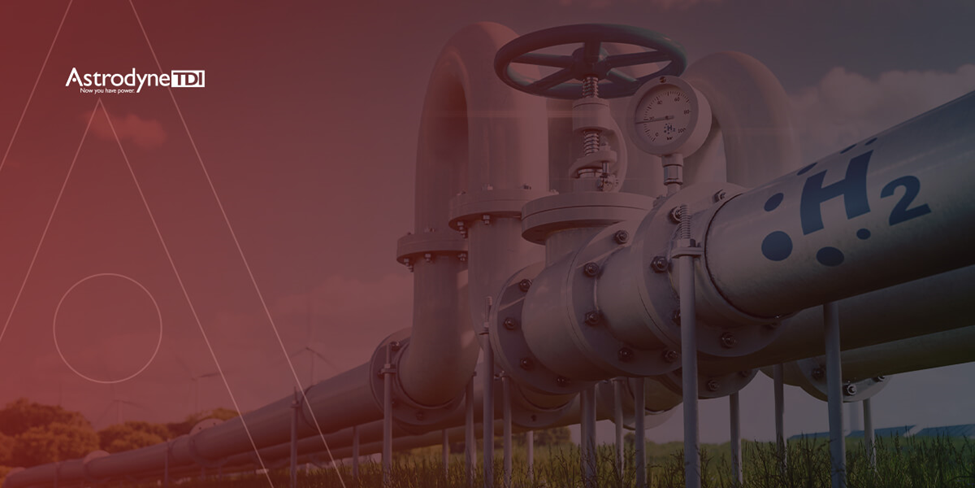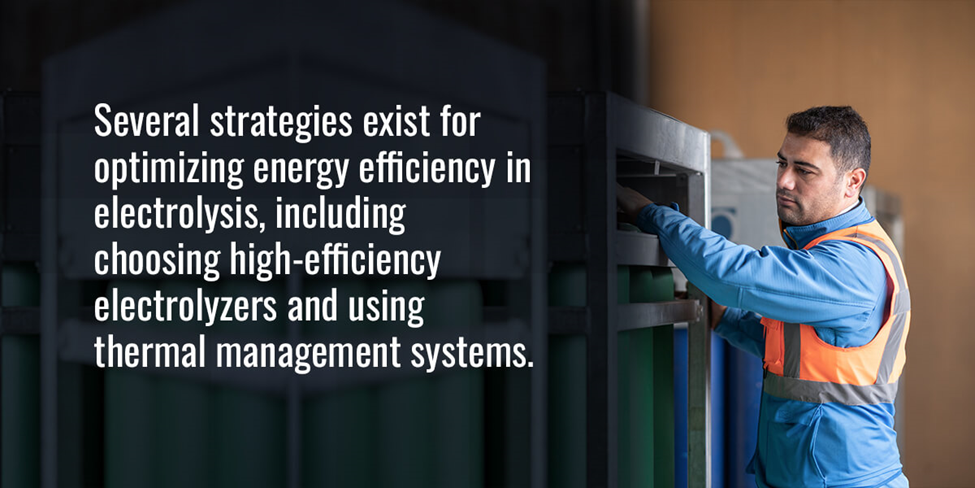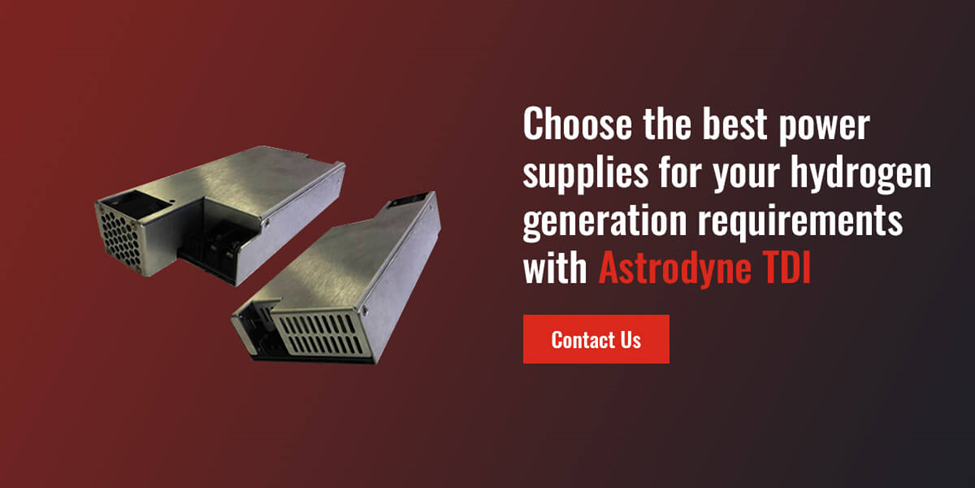RESOURCES
Understanding Power Requirements for Hydrogen Generation

Hydrogen generation has skyrocketed in recent years as organizations search for viable alternative energy sources to power vehicles, backup power, and more. Although several methods exist to generate hydrogen, green hydrogen, which uses renewable energy-fueled electrolysis is gaining popularity due to its sustainability and potential to reduce carbon emissions.
Power supplies are critical for successful electrolysis, and the right one can boost energy efficiency. Understanding electrolysis power requirements is the first step to making the right choice and increasing profitability.
An Introduction to Electrolysis and Its Power Demands
Electrolysis is a chemical process that uses electricity to split an H2O into its element, Hydrogen, and oxygen. It's most commonly used to separate water into hydrogen and oxygen gas, generating hydrogen as an alternative power source.
The process works by placing two electrodes in a water-filled container. The electrodes are connected to a power source. As the electricity flows through the electrodes, it causes a chemical reaction in the water.
Positively charged ions from the water are attracted to the anode and give up electrons, creating oxygen gas. The cathode attracts negatively charged ions and gains electrodes, forming hydrogen gas. You can collect the hydrogen and oxygen separately.
Hydrogen is the most abundant element in the universe. Electrolysis is essential to extract hydrogen for clean, green power generation, but the process is energy-intensive. The faster you generate hydrogen, the more power you need per kilogram, making power supplies for electrolysis critical in your decision-making process.
As an effective form of hydrogen generation, electrolysis is critical in many industries that rely on hydrogen, from rocket fuel production and refining petroleum to hydrogen fuel cells in energy generation and powering vehicles.
Overview of Power Requirements for Electrolysis
Understanding what power supply is needed for electrolysis is the first step to creating an economically viable hydrogen generation strategy. Electrolysis power supplies vary, depending on the energy source. As the process requires a great deal of power, grid electricity has proved the most reliable power source. However, it comes with considerable expense and causes greenhouse gas emissions. Renewable energy sources are a viable option, although less reliable than the power grid.
An electrolysis system with no inefficiencies would require 39.4 kilowatt hours (kWh) of electricity to produce a kilogram of hydrogen. Most commercial devices have some inefficiencies, so a standard operating amount is about 50 kWh per kilogram. Hydrogen generation is an excellent way of reaching national sustainability goals, but energy efficiency is a chief consideration. The higher the cost per kilogram, the less accessible the technology becomes.
Understanding Energy Efficiency in Electrolysis
Efficiency is critical for electrolysis operations, as power consumption is the chief operating cost. On a large production scale, you must consider several efficiency parameters to get an accurate view of the overall picture:
- Voltage efficiency: The quotient of thermo-neutral voltage and the measured cell voltage quantifies the energy lost through heat.
- DC efficiency: This parameter comprises the efficiency of a module or stack. It represents the ratio of energy input to the stack in the form of DC and the energy content of the usable hydrogen at the stack output.
- System or plant efficiency: While this parameter is specific to each operation, it quantifies overall losses, including those from AC/DC conversion, water treatment, cooling systems, and hydrogen purification.
Several strategies exist for optimizing energy efficiency in electrolysis, including choosing high-efficiency electrolyzers and using thermal management systems.

Types of Power Supplies for Electrolysis
Two primary types of power supplies exist for hydrolysis:
- Direct current (DC) power supply: DC power supplies are the most common in electrolysis, providing a constant, unidirectional flow of electric current. These power supplies are essential in electrolysis as they ensure a consistent flow of electrons in a specific direction, allowing the water to separate into its constituent elements of oxygen and hydrogen.
- Alternating current (AC) power supply: These power supplies periodically alternate the direction of current flow but require additional components like diodes and rectifiers for electrolysis applications. AC electrolysis is often less efficient and more complex than DC alternatives.
Selecting the Right Power Supply
Choosing the correct power supply for hydrogen production involves more than selecting the best type. It's important to assess several other factors to boost operational efficiency, including:
- Capacity: Your chosen supply should have the necessary capacity for electrolysis. Consider your desired hydrogen production related to the electrolyzer's power demand. The power supply must handle the required load without overheating or experiencing voltage drops.
- Efficiency: Minimizing wasted energy is crucial in any hydrogen generation operation. Discuss efficient options with your supply and consider the supply's power conversion efficiency and compatibility with the electrolyzer to achieve optimal energy utilization.
- Control and monitoring: Integrated control and monitoring features provide better management over the electrolysis process. Look for a power supply that allows for precise voltage and current adjustments. Consider advanced monitoring capabilities to ensure operational safety and stability.
- Scalability: As your operation grows, your power supply should accommodate the increased power demands. Consider how easy it would be to expand to meet your future needs.
Custom Power Solutions for Specialized Electrolysis Applications
Specialized electrolysis applications face unique challenges. Heat is the most common issue, as electrolytic capacitors degrade faster in high ambient temperatures. It's also essential to consider the total cost of ownership, including energy losses over your power supply's useful life.
As more organizations move from grid energy to renewable electricity, custom power supplies for electrolysis have come to the fore. These power supplies can meet the unique power requirements of hydrogen generation in the following ways:
- Lower energy costs: Custom power supplies can mitigate some of the expected energy losses during electrolysis, as they're purpose-built for this specific application.
- Reduce heat: If your facility is in a warm environment or small enclosure, you may find that excess heat affects the longevity of all components in that area. Custom power supplies with thermal management can reduce the heat introduced into the control enclosure, potentially eliminating the need for cooling systems or additional space.
- Prolong component life: Custom power supplies minimize stress on your electrolytic capacitors and other components, increasing the life span of all components in the enclosure.
- Withstand various environments: Every facility is unique, and making off-the-shelf power supplies work in limited space can be challenging. Custom power supplies eliminate this issue, as they can be constructed to work in unique spaces.
Find the Right Power Supply With Astrodyne TDI
Powering electrolysis involves meeting unique and demanding power requirements. Working with a power supply manufacturer that understands the rigors of hydrogen generation is essential to finding the best solutions for your application. No matter what type of power supply you need, Astrodyne TDI can help.
Astrodyne TDI has been an industry-leading power provider for decades, meeting our client's needs in numerous power applications across various industries. We offer custom solutions for even the most robust environments, regardless of your application's challenges. Our experienced team will walk you through the options and help you choose the best power supplies for your hydrogen generation requirements.
Get in touch with us today to learn more or request a quote, and let us worry about the power so you don't have to.


